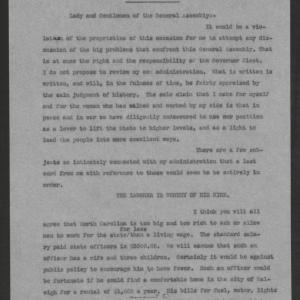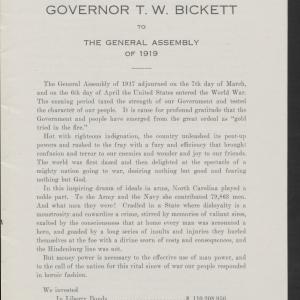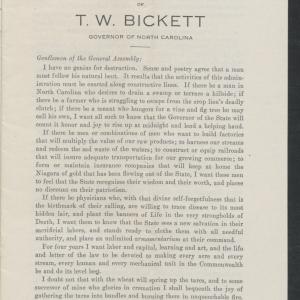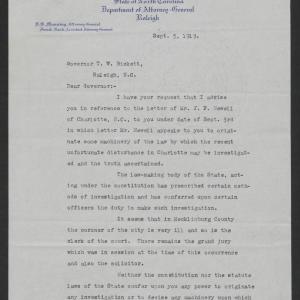- Transcription
SOUTHERN
TEXTILE BULLETIN
DAVID CLARK, Managing Editor
CHARLOTTE, N.C.
June 20, 1919.
Governor T. W. Bickett,
Raleigh, N.C.
My dear Governor:
Yours of the 17th to hand and contents very carefully noted.
I am very glad to know that you were not advised of conditions of affairs as existed in Cabarrus County after your proclamation. It is a fact that there was a lawless element entirely in control of affairs and neither the officers or law of Cabarrus County or the city of Concord, N.C. did anything to protect those who desired to work. On Wednesday morning following your proclamation, the mills opened for business after having stated that they would employ union and non-union labor on equal basis, but the union labor would not permit the non-union labor to enter the mills and those who attempted to do so were subjected to insult and personal violence. The case of Will Reinhardt is only one of dozens that occured at Concord and no effort whatever was made to protect them.
Later the mills did arrange to start up and are now operating but already troubles have begun. This week, a woman working in one of the mills left her work in bad condition and seated herself for a long period in one of the mill windows. When instructed by the overseer to return to her work she replied that she was a member of the union and proposed to sit in the window just as long as she pleased and be paid for her time. The woman was discharged for not attending to her work, just as a non-union operative would have been discharged, and yet the president of the union labor notified them that unless she was put back to work there would be a strike. This is a sample of the attitude of the labor unions and the trouble that may be expected.
I note with much interest your statement that I do not offer anything better in the way of organization for labor, but the proposition before us is the passage from the non-union to the union state and it seems to me that the burden of proof should be upon the union to show that if offers advantages over the non-union.
Theoretically, the object and advantages of labor unions are as follows:
First: Advancing and maintaining wages; second, improvement in working conditions; third, improvement in living conditions.
If you will investigate the history of the textile industry of the North and that of the South for fifteen years prior to the war, you will find that during that entire time Northern mills were subjected to strikes and there was never a week that there was not a strike at some mill. During those fifteen years there was scarcely a strike in the South and almost perfect harmony between the mills owners and mill operatives existed.
During those fifteen years wages advanced faster among the cotton mills of the South on voluntary action than they did in the mills of New England where advantages were only given upon demand of the operatives and usually following long strikes. Mill owners were not inclined to voluntary give anything when they knew that it would be the basis of being forced to give more through strikes. If labor unionism produces better wages it has certainly not done so in the case of the New England mills for our wages are higher in proportion to the cost of living.
During the war our cotton mills advanced wages as rapidly as possible and if you would go into the cotton mills of any community and compute the income of any family based upon the full week's work you would find that their income averages larger than the income of the doctors and lawyers in the nearest city. You must realize of course that the cotton mill operatives often do not average over four days work a week and the higher the wage the less the average number of days work.
The second point claimed by unionism is that working conditions are improved by the efforts of the labor union, but any fair minded man will tell you that there is no comparison between the working conditions in Southern cotton mills and those in New England. Under the friendship between the employees and the owners of the mills in the South, the mill owners have, with few exceptions, done everything possible to provide sanitary and healthy working conditions and while there are, of course, a few mills that have not made such efforts, the working conditions in the cotton mills of the South are equal to those of any great industry in this country. Under labor union domination the cotton mills of New England have not been willing to spend the money for improvements, such as have been made in the cotton mills of the South where there were no unions to disrupt co-operation.
It is also contended that labor unions will force better living conditions and here again we find the same proposition in that the cotton mills of the South have, as a rule, provided good homes for the people and there has been a constant tendency to improve those homes and add all modern conveniences to same. In New England where there has been labor union domination the mills have not been willing to spend money for such improvements and on account of the labor troubles very few of them have any mill village whatever. In consequence the mill employees have lived in rented homes and there is no comparison in their living conditions and those of the southern cotton mills.
You state that I do not offer anything better in the way of an organization for the labor people, but I do say that the non-union conditions in the South have produced better wages, better living conditions, and better working conditions than the mills in New England. Proof is absolutely lacking that unionism will benefit the mill operatives of the South in anyway.
If we are to change from non-union conditions to those of unionism it seems to me that the burden of proof must be on the unions. The cotton mill people of the South have been contented and the overwhelming majority of them have no desire to join any union. The labor troubles have been stirred up by professional agitators from New England and by a few local men who saw in the movement a personal gain for themselves.
The mill operatives of the South are a far superior people to the foreign element that furnishes the operatives for New England mills and they are rapidly becoming skilled in the spinning and weaving of the finer fabrics.
The textile industry of England is so strangled by union labor that it is now difficult to complete for foreign trade and the result of the growth of union labor in New England has been the building of very few new cotton mills in the past ten years.
I know not who has financed this sudden entrance into the South of labor union leaders, but if the labor condition of the South could be seriously disrupted it would vastly benefit both England and New England, and people have been known to finance propoganda for movements that will benefit them.
I am absolutely convinced that labor unions will not benefit the mill operatives of the South and I am also convinced that unionzation will produce continued labor troubles which will injure both the operatives and the mills.
I am exceedingly glad to know that you will use the power of the State of North Carolina to protect those who desire to work without becoming a member of a union.
Yours very truly,








